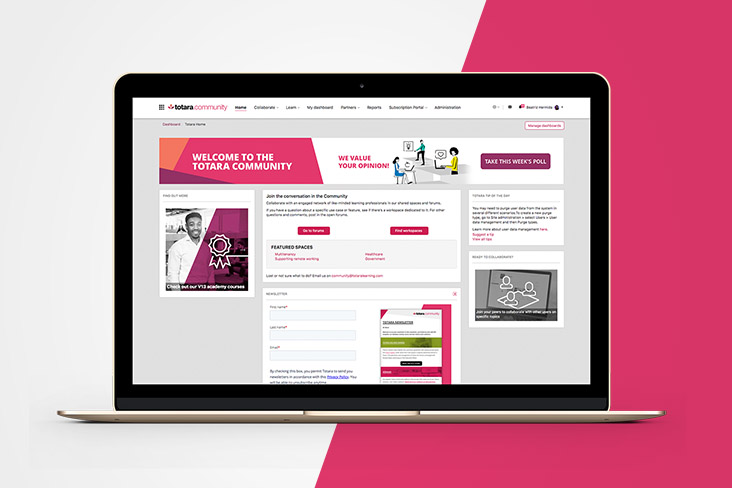How someone starts at your organisation can really set the tone for how they’ll work over their time with you. A massive ‘88% of employees’ think that their employer did a poor job with the onboarding process, showing that for most of us, there’s a lot of work to be done.
Getting onboarding right is vital to ensure your new starters are productive, happy and stay in your organisation for a long time. And it’s not just the new employees that can be damaged by a poor onboarding process. ‘Onboarding new team members can also influence the emotional tone and interaction between existing team members.’ Or in other words, creating a poor onboarding experience can disrupt a high functioning team by accidentally introducing new damaging behaviours and values. There’s lots at stake when it comes to getting onboarding right and for most of us this means reshaping and rethinking the current onboarding experience for our new starters.

Onboarding in the new normal
As a result of the Covid-19 pandemic we’ve seen a huge transformation in how employees work. Many organisations are still debating the best ways to work, whether that be on location, hybrid, or fully remote. Due to this transformation organisations’ onboarding practices are rapidly becoming out of date. We need to rethink our current onboarding practices as what employees expect from their onboarding experience has also shifted.
‘Today’s new hires expect onboarding experiences that allow for a much greater degree of flexibility, customisation and personalisation. Similarly, many new hires expect hiring, onboarding, and learning and development to be interconnected to generate new learning and career opportunities.’
Organisations that continue to roll out generic onboarding programs that:
- Lack the big picture of how a career can be developed
- Don’t provide spaces where knowledge can be easily shared across teams
- Are not personalised
- Don’t fit into a new hybrid or remote world
risk poor performance, low staff morale and retention issues.
Onboarding through formal training
As soon a candidate has accepted a job they can start the process of learning all about their new role and your organisation.
Through Totara, you can quickly set up courses, programs and certifications with a range of interactive activity types to ensure all new starters are trained on essential information. Mandatory compliance training on topics such as health and safety and IT security can be easily set up in Totara.
Onboarding doesn’t stop at formal courses
An easy mistake to make when onboarding new starters is to think that once you’ve set up your formalised onboarding courses that onboarding is complete. In order to keep, motivate and develop talent you’ll need to move beyond formal learning to create a more rounded onboarding experience.
Moving beyond formal learning
‘The step beyond formal learning is an essential one for L&D teams to make if their solutions are to contribute value to organisational, team, and individual performance improvement. Studies find that much of the performance of workers is driven by learning by doing or learning from peers or supervisors in the workplace.’
Don’t isolate your new team members
Imagine this scenario; day one of a new job. A new starter is excited by the prospect of hitting the ground running in their new place of work. Before Covid-19, this may have involved going to an office and meeting their team as well as other colleagues across their organisation. However, with a shift to remote working, a new person’s first day could be quite an isolated one if not thought through.
A poorer onboarding experience might involve a new starter taking their formal learning courses and passing short assessments to prove they understand what’s expected from them in their new role. After a day or a week of going through this set of formalised onboarding they’ll be expected to get to work!
However, by this point a new starter may not have developed many relationships in the organisation and as soon as they start their first set of tasks, it’ll quickly become apparent that there’s lots of information they need that wasn’t included in their formalised onboarding. So how can new starters succeed in those vital first few days and weeks especially in remote roles?
Create knowledge sharing networks
New starters need spaces where they can connect with their peers to ask questions and allow knowledge and resources to be shared. Sharing knowledge effectively is just as important as having formal training courses and events set up. Our educational tools need to help teams easily share the specialised knowledge that sits within each department and that accurately reflects how a task can be completed at that specific time.
This wasn’t in my induction course?
Another problem that is likely to occur if you only have formalised training set up for your new starters is that work might not be as it is described in formalised onboarding courses.
Jennings explains this issue is the difference between work as described or imagined, vs work as performed or done.
‘Work-as-imagined describes what should happen under normal working conditions. Work-as-done, on the other hand describes what actually happens, how work unfolds over time in complex contexts.’
In a changing work landscape, it’s important to realise that how a task is completed will be forever in flux, meaning that the perfectly scripted scenario as described in a piece of onboarding training will likely differ from the reality of completing a task. It’s by allowing workers to share their tacit knowledge effectively that we can support new starters as they learn by doing in the flow of work.
Connecting onboarding to continuous learning and career development
‘At the moment, few workplaces explore the connection between onboarding, continuous learning and organisational development.’
It’s also vital to think about how your initial onboarding training links up to a clear career path for your new starters. If the only real training employees get is right at the start of their journey with you, it’s likely that they’ll quickly become disengaged with work and move on to somewhere where they can see the potential for progress in their career.
Showcasing a new starters career path with you from the initial phases of their onboarding will allow an individual to visualise how it is that they will succeed with you for many years to come.
Getting onboarding right
Totara works with organisations all over the world to help ensure all new starters get a great onboarding experience. If you’d like to see how organisations including the Met Office are getting their new starters up to speed then take a look at our free onboarding with Totara course in the Totara Academy today.



